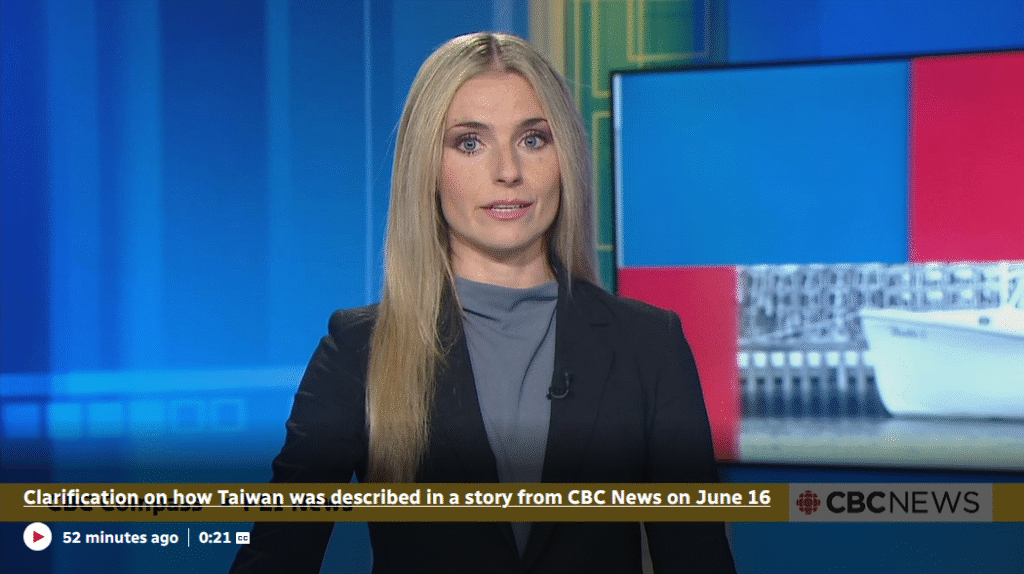In a move likely to anger China… Chinese people are going to complain… Someone was forced to apologize online after Chinese netizens wrecked them for a perceived offense…
You hear that a lot, don’t you?
How often do you hear the opposite? Something like, “Taiwanese people complained, and they got vindicated”?
And yet, that’s exactly what happened when Canadian public broadcaster CBC went too far and faced repeated complaints from Taiwanese netizens, to the point it had to correct the record.
From correction to viral posts
Let’s break down the timeline of events.
On June 16, CBC published a piece on the infiltration of temples in Canada by pro-CCP elements. In it, the journalist called Taiwan a country.
Two days later, CBC published another page with a text and video apologizing. CBC wrote: “The reporter said Taiwan is a country that China is threatening to invade. In fact, Taiwan is a self-governing island, and there is dispute around who controls it.”
This is one step beyond what we usually read.

In general, Anglophone media use the formulation “Taiwan is a self-governing island that China claims as its own” — or subtle variations of the kind.
But CBC went further than that.
For a start, CBC made the special effort of publishing a separate video just to say this, rather than simply editing their original story.
But CBC also did worse than what we are used to seeing on Taiwan. It’s true that most Anglophone media avoid the term “country” for Taiwan. If CBC had stuck to euphemisms like “self-governing” or “democratic,” they would have gone unnoticed: it would be unfair to single them out for something everyone does.
But CBC did more. They said: “there is dispute around who controls” Taiwan. And that was too much. There is no dispute over who actually controls Taiwan.
One step beyond
Again, calling Taiwan a “self-governing island” doesn’t come from one broadcaster in particular. The main culprit for the ubiquity of this sentence is Reuters, the respected wire service that feeds newsrooms around the world. For reasons of its own, Reuters has elected to systematically include the description “a self-governing island China claims as its own” (or subtle variations) in all its wires related to Taiwan.
The vast majority of journalists will repeat it, not because they hold a position on Taiwan, but because they don’t know better. They may not be familiar with the sensitivities of every country, or they may simply find it easier. Because Reuters is otherwise on point and well-informed, the narrative seeps through.
But CBC went further than the “Reuters line.” Their blunder – stating, wrongly, that “there is dispute around who controls it” – went beyond the usual discourse. And this gave Taiwanese netizens an opportunity to act.
“Canada is an inseparable part of USA, is that right?!” – @wing8828 on Threads (several netizens posted such comments lampooning CBC’s clarification on Taiwan)
That’s why I took it to social media. And it got traction: the post on Threads – a social media platform now rivaling Facebook in Taiwan – surpassed 25,000 views and was widely shared. A popular Taiwanese Facebook account devoted to commenting on international media, with over 37,000 followers, followed suit: their post received over 2,000 likes and 200 shares, making the reach exponential.
In both cases, the posts included direct links to the CBC Ombudsman, encouraging users to file official complaints. Taiwanese netizens confirmed they had done so. One even posted a screenshot of their complaint:

Another shared the response from CBC’s Ombudsman:

And what happened next?
By the next morning in Canada, the apology page was taken offline.
Try it: this link now returns a 404 error. The only way to see the apology is through this archived version.
This is usually the kind of thing that happens when China gets angry. But this time, the outrage came from an angry Taiwan.
The reason you see a 404 page is because Taiwanese people complained, not Chinese netizens. Two days later, Taiwan’s Ministry of Foreign Affairs expressed concerns to local media about CBC’s comment, but that came after CBC took down the page.

So, is this a success?
Yes. But it’s not a revolution.
CBC handled it smartly. If you look at the original article now, it includes a small disclaimer at the bottom: “Taiwan is a self-governing island, and sovereignty claims over the territory are disputed.” That phrasing cannot really be contested. After all, it’s true that China claims Taiwan. That disclaimer wasn’t in the original version — which you can see here, on archive.
In short, CBC responded to complaints by retreating to the industry standard – the “Reuters line” – rather than maintaining a unique and clearly inaccurate statement.
So yes: a win, because Taiwanese netizens made a major broadcaster fix their mistake. But the status quo in international media remains.
Read also:
Right now, the bar for satisfying Taiwanese audiences is very low. Most people dislike hearing their sports team called Chinese Taipei, but would rather that than be excluded from competitions. They may dislike the ROC flag, but still prefer it to being labeled a Chinese province. The “Reuters line” stings, but at least the world’s biggest news agencies don’t outright say Taiwan belongs to China.
Reversing the global tide of euphemisms like “self-governing island” would take more than a few viral posts. It would mean a massive, sustained international campaign targeting newsrooms, international organizations, and corporations, at scale.
But stopping one Canadian broadcaster from going below even the lowest bar? That was achievable.
Taiwanese netizens rallied online and drew the line. After years of semantic erosion around Taiwan’s status, they forced a retreat, even a small one, from a narrative that had gone too far.
If they can start like this, and keep going, maybe someday, they’ll not just stop the slide: they’ll reverse it.
